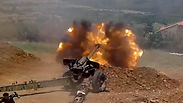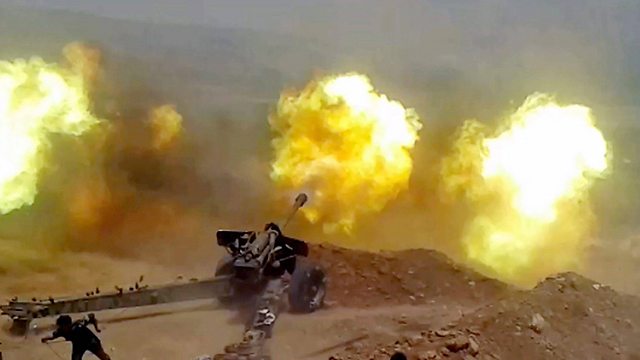
Rebels cut water to Damascus, Syrian Army goes on offensive
The Ein al Fija spring which provides 65 percent of Damascus's water supply has been cut off by rebels; rebels also allegedly contaminate water with diesel fuel; the spring is also a crucial waypoint for Iran to smuggle weapons to Hezbollah.
The Syrian army has blamed rebels for polluting the springs with diesel fuel in a move the water authorities said had forced them to cut supplies coming into the capital and resort to reserves to temporarily cover the shortfall. Rebels deny poisoning the water as they say it would harm them before anyone else.
A resident and rebels said the aerial bombing has put the Ein al Fija spring's water pumping station where a underground pipeline out of commission. The spring normally provides around 65 percent of the water to the capital's neighborhoods.
Rebels said the army shelled and bombarded several towns in Wadi Barada valley about 18 km (11 miles) northwest of the capital in a major offensive launched Friday. The roads leading to the towns in the valley and the mountain cliffs surrounding the area are under the control of elite Republic Guards and the Lebanese Shia Hezbollah group, they said.
A picture taken by a rebel and seen by Reuters showed the pumping station's ceiling has collapsed. Several videos uploaded on social media show damage and fires with plumes of smoke near the pumping station. Others show damage to houses.
The rebels have allowed the government's water authority engineers to maintain and operate the station and supply the capital since they took control of the area in 2012. The rebels draw from both Islamist and Free Syrian Army factions.
Alongside the main spring in Wadi Barada, the area lies on the road from Damascus to the Lebanese border that is used as a supply line for Hezbollah. Iranian weapons pass through this valley to get to Hezbollah controlled territory in Lebanon. The weapons are then prepped to be used against Israel.
Residents said fighting on Monday focused on Baseimeh village at the edge of the valley where the army and its allies are pushing to advance deeper in an enclave where 10 villages are inhabited by an estimated 100,000 people.
Rebels and residents said the bombing has also killed 14 civilians and hit a medical clinic and civil defense unit in the area that has been besieged with limited access for food and fuel.
The army said it was targeting "terrorists."
The rebels said the army was emboldened by gaining full control of Aleppo city and was seeking to force them to either leave or face all out war.
"They are seeking to push us into a surrender deal to and we will not hand over our land," said Abu al Baraa, a commander in Ahrar al Sham, a rebel group present in the area.
Through a series of so-called settlement agreements and army offensives, the Syrian government, backed by Russian air power and Iran-backed militias, has been steadily suppressing armed opposition around the capital.
Fighters from the area have cut water supplies several times in the past as to try and prevent the army from overrunning the area.











